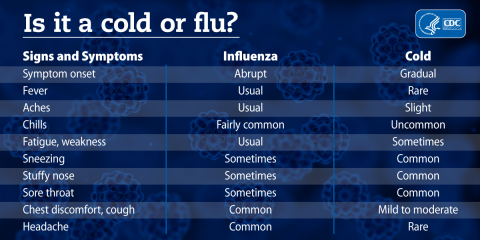Influenza (the flu) is a contagious disease caused by a virus. It is spread by coughing, sneezing, or respiratory secretions.
The UNH community can work together to prevent the flu with a few simple steps:
- Get vaccinated.
- Cover your coughs and sneezes.
- Wash your hands often.
- When in doubt, get checked out. If you are experiencing symptoms, call Health & Wellness at 603-862-9355 for guidance.
Influenza Self-Care
Sore Throats and Respiratory Symptoms Self-Care Guide
Get Vaccinated
A yearly flu vaccination is the best way to reduce your chances of getting the seasonal flu and lessen the chance you will spread the flu to others. We strongly encourage you to get your flu vaccine, which is available at Health & Wellness.
Vaccination Appointment
The flu vaccine is offered to students, faculty, staff, and dependents by appointment. Make an appointment online or call 603-862-9355.
Please bring your student/staff ID when you come to get vaccinated. Allow a 15-minute wait time after receiving the vaccine.
Be sure to upload your insurance card to MyHealth&Wellness when you book your appointment or prior to walking in, as vaccinations are billed to insurance. For employees who are not covered by the USNH policy, please check with your insurance company prior to your visit to ensure that they will cover the cost if you receive your vaccination at Health & Wellness.
Note: We do not have the FluMist® or the 65 and older high dose seasonal flu vaccine.
Cover Your Coughs and Sneezes
Cover Your Cough
- Cover your mouth and nose with a tissue, your elbow or shoulder when coughing or sneezing.
- Dispose of your tissues properly.
Avoid Touching Your Eyes, Nose, or Mouth
- Germs are often spread when a person touches something that is contaminated and then touches his or her eyes, nose, or mouth.
Don't Share
- Don’t share towels, eating utensils, toothbrushes, drinking glasses, or other items that may spread germs.
- Even if someone is not sick at the time of sharing, he or she may still be contagious for flu or cold that can develop into symptoms the next day.
Avoid Close Contact
- As much as possible, avoid close contact with people who are sick.
Take Care
You can also prevent the spread of the flu by taking care of yourself when you are sick.
Wash Your Hands Often
- You can pick up germs/viruses through shaking hands, touching doorknobs, phones, computers, etc.
- Washing your hands will help protect you from germs/viruses.
- Wash all surfaces of your hands thoroughly (fingers, between fingers, palms, back of hands and wrists) with soap and water.
- CDC Guidelines: Wash Your Hands
- Download, print, and share our handwashing poster (right).
COVID-19 vs. Influenza
While both the flu and COVID-19 are contagious respiratory illnesses, you should familiarize yourself with the key differences between them. These include differences in symptoms, how long it takes for symptoms to appear after exposure, and how long someone with the viruses are contagious, along with how they spread, treatments, complications, and vaccine status.
Please visit the Centers for Disease Control and Prevention website for more information.
Additional Resources
- CDC: About the Flu
- Cover Your Cough (CDC) Flyer
- Bird Flu
- Vaccines How Do They Work?
- Antibiotic resistance Q & A
- Thimerosal in Vaccines
- Treatment of Flu
- Pneumococcal vaccine: Recommended for certain high-risk groups. Available at Health & Wellness.
- Respiratory Syncytial Virus Infection (RSV)


